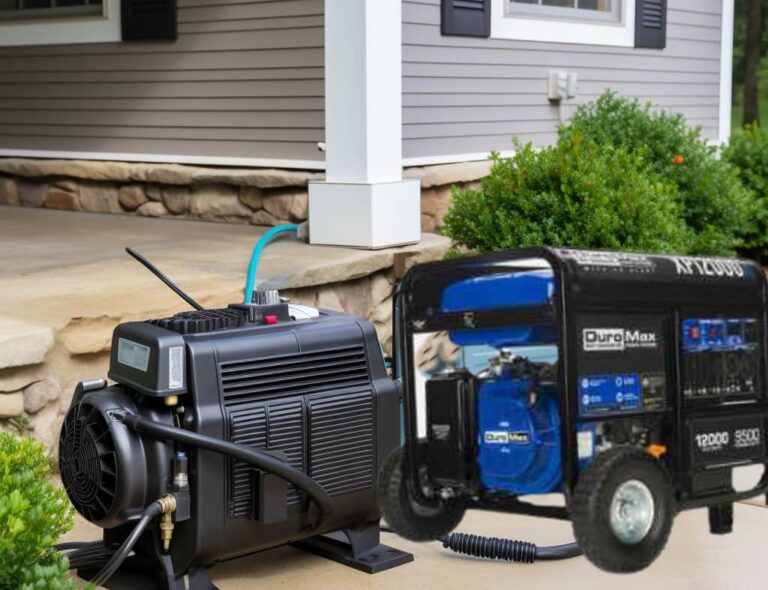Fuel and Treatment Options for Generator Storage
Have you ever experienced a blackout and wished you had a dependable generator to keep your power running? Well, I’ve got some valuable information for you.
When storing generators, the fuel and treatment options play a vital role in ensuring smooth operation. In this piece, we’ll delve into the various fuel types, the significance of fuel treatment, and best practices for long-term storage.
So, let’s get started and make sure you’re prepared for any blackout situation!
Types of Fuel for Generator Storage
I highly recommend utilizing ethanol-free gasoline for the long-term storage of your generator. This will help avoid potential issues with fuel integrity and oxidation. Regular unleaded gasoline containing ethanol can cause problems. It has the ability to bond with moisture present in the air, compromising the quality of the gasoline over time. This can lead to fuel degradation and the formation of deposits in the fuel system. These issues can negatively impact the performance of your generator.
To maintain your generator’s efficiency and prevent any possible complications from using regular gasoline, it is paramount to opt for ethanol-free gasoline when storing it for extended periods. By doing so, you can ensure that the fuel remains stable and does not undergo oxidation. This will keep your generator in optimal condition and ready for use whenever needed.
The Importance of Fuel Treatment for Generator Storage
Regularly utilizing a fuel stabilizer such as Stabil or Sea Foam can assist in safeguarding the integrity of the gasoline and preventing complications during the storage of generators. It is of utmost importance to take proper care of our generators, particularly during storage, to ensure their readiness to power our homes when the need arises.
Here are three compelling reasons why fuel treatment is vital for generator storage:
- Averts oxidation and the bonding of moisture with ethanol in gasoline, thereby maintaining the cleanliness and dependability of the fuel.
- Shields the engine by eliminating deposits and preventing accumulation, guaranteeing optimal performance.
- Prolongs the generator’s lifespan by upholding the fuel system and thwarting corrosion.
Ethanol-Free Gasoline: The Best Option for Long-Term Storage
Using ethanol-free gasoline is the recommended choice for the long-term storage of my generator. It’s the ideal option because regular gasoline with ethanol can cause problems over time, such as bonding with moisture and corrupting the fuel.
Additionally, regular gasoline loses its volatiles and can result in deposits in the fuel system. To avoid these issues, I opt for ethanol-free gasoline.
Maintaining my generator’s excellent condition is crucial, so I also utilize a fuel stabilizer like Stabil or Sea Foam. These products aid in safeguarding the gasoline from oxidation and moisture.
Whether I select Stabil or Sea Foam, as long as I employ a stabilizer, it should not make a significant difference. Taking proper care of my generator and utilizing the appropriate fuel for long-term storage helps me feel connected to a community of responsible generator owners.
Popular Fuel Stabilizers for Generator Storage
Stabil and Sea Foam are popular fuel stabilizers at stores such as Home Depot or online on Amazon. These products play a vital role in properly storing and maintaining a generator. Here are three compelling reasons why utilizing a fuel stabilizer holds significance:
- Safeguards gasoline from oxidation and moisture, ensuring its integrity.
- Thwarts the formation of deposits in the fuel system, preserving the cleanliness of the engine.
- Assists in maintaining the volatile properties of gasoline, facilitating easier generator startup when required.
Employing a fuel stabilizer gives me a sense of tranquility, knowing that my generator remains primed for operation during power outages. Additionally, it aids in extending the engine’s lifespan, resulting in long-term cost savings.
Hence, remember to acquire a bottle of Stabil or Sea Foam on your next visit to the store!
Storing Your Generator With Gasoline: Best Practices
When storing my generator with gasoline, I keep track of oil changes and jot down the last oil change date and type of oil used on a piece of duct tape. This helps me stay organized and ensures I don’t forget when the next oil change is due.
Maintaining the generator well is vital to guarantee optimal performance when required. Additionally, I take the time to run the generator outside every month or so to prevent carbon monoxide fumes from entering my house. Safety is my top priority, and I want to ensure I take all the necessary precautions.
Storing Your Generator Without Gasoline: Proper Steps to Follow
Properly storing a generator without gasoline involves a series of important steps.
Firstly, it is crucial to drain the fuel tank completely and allow the generator to run until it stops. This ensures that no fuel remains in the system, which could deteriorate over time.
Once the generator has ceased running, removing the spark plug and applying a small quantity of oil to the cylinder is advisable to prevent any potential corrosion.
After completing these initial steps, the generator should be stored in a cool and dry location, away from excessive moisture and extreme temperatures. This is of utmost importance to maintain its optimal condition.
Furthermore, covering the generator with a protective shield safeguards it from dust and debris, ensuring its longevity.
Long-Term Storage Considerations for Generators
When considering long-term storage for your generator, it is highly recommended to utilize a fuel stabilizer, such as Stabil or Sea Foam, to prevent potential fuel degradation and engine issues.
Delving into storing your generator for an extended period, there are a few important factors to remember. Even if you opt for ethanol-free gasoline, employing a fuel stabilizer is still a wise decision. This will help safeguard your fuel from oxidation and moisture.
Disconnecting the battery and storing it separately to avoid drainage is crucial. Regularly inspecting the generator during storage and promptly addressing any issues is equally important.
Starting Up Your Generator: Essential Steps for Proper Operation
I ensure the engine switch is turned on, the choke lever is closed, and the fuel valve lever is open before starting my generator. This ensures that the generator is prepared for operation and prevents any complications. It is essential to adhere to these steps to guarantee a seamless startup process and proper generator functioning.
Here are three essential actions for initiating your generator:
- Inspect the engine switch, choke lever, and fuel valve lever.
- Operate the generator for a few minutes to warm up the treated gas.
- Shut off the fuel valve lever to cease the supply of gasoline.
By following these actions, you can ensure your generator is prepared to generate power when needed.
Maintaining your generator to maximize its efficiency and durability is crucial.
Shutdown Process: How to Safely Turn Off Your Generator
When shutting down the generator, remember to switch off the engine, shut the choke lever, and close the fuel valve lever to ensure a secure and proper shutdown process.
It’s crucial to take these measures to safeguard the generator and prevent any potential hazards. By turning off the engine switch, you guarantee that the generator is completely powered down and not consuming any fuel.
Shutting the choke lever aids in restricting the flow of gasoline in the carburetor, preventing any possible flooding.
Lastly, closing the fuel valve lever cuts off the fuel supply to the engine, preventing any leaks or mishaps.
Taking Care of Batteries: Maintenance Tips for Generator Storage
To properly maintain the batteries during generator storage, charging them approximately every 30 days is important. This ensures they remain in optimal condition and are ready for use when necessary.
Taking care of the batteries is vital for the overall performance and longevity of the generator. Here are some tips to assist you in maintaining the batteries during storage:
- Utilize a battery maintainer or trickle charger to keep the batteries charged.
- Ensure that the batteries are clean and free from dirt and corrosion.
- Regularly inspect the batteries for any indications of damage or wear.
By adhering to these suggestions, you can guarantee that your generator batteries retain their optimal condition, providing you with dependable power when needed.
Taking care of the batteries is an essential aspect of generator maintenance and will assist in prolonging the lifespan of your equipment.
Frequently Asked Questions
What Are the Potential Issues With Using Regular Unleaded Gasoline for Long-Term Generator Storage?
Using regular unleaded gasoline for long-term generator storage can pose potential issues. The ethanol content present in this type of gasoline can adversely affect the fuel, leading to evaporation and oxidation. Instead, it is advisable to opt for ethanol-free gasoline or use a fuel stabilizer to prevent these problems.
It is crucial to consider alternative options for long-term generator storage due to the negative impact of ethanol on the fuel. This alcohol-based component can lead to the deterioration of the gasoline, resulting in evaporation and oxidation. Delving deeper into the matter, the ethanol content can corrupt the fuel, causing it to degrade over time.
In light of these concerns, it is important to explore alternatives such as ethanol-free gasoline or the adoption of a fuel stabilizer. One can circumvent the detrimental effects of ethanol on the fuel by utilizing ethanol-free gasoline. Equally important, the use of a fuel stabilizer can help maintain the integrity of the gasoline during long-term storage.
Not to mention, using ethanol-free gasoline or a fuel stabilizer is equally beneficial for generator longevity. It ensures that the fuel remains in optimal condition, preventing evaporation and oxidation. Identically this approach uniquely safeguards the generator’s functionality and efficiency.
Furthermore, it is worth mentioning that ethanol-free gasoline or a fuel stabilizer can be used with regular maintenance practices. Similarly, these measures can be employed with other precautionary steps to ensure the generator’s long-term performance. Moreover, by implementing these strategies, one can avoid potential complications from using regular unleaded gasoline for storage.
Therefore, when considering long-term generator storage, it is advisable to use ethanol-free gasoline or a fuel stabilizer. Firstly, this helps prevent fuel corruption caused by ethanol content. Secondly, it ensures the generator’s fuel quality preservation over an extended period. Thirdly, it safeguards the overall functionality and reliability of the generator.
What Are the Benefits of Using Ethanol-Free Gasoline for Generator Storage?
Using ethanol-free gasoline for generator storage has numerous advantages. It prevents the contamination of gasoline by bonding with moisture, avoids the loss of volatility, and diminishes the formation of deposits. It is indispensable for long-term storage.
Delving into the topic at hand, it is important to highlight that ethanol-free gasoline safeguards against the negative effects of moisture on the fuel. By bonding with moisture, ethanol can lead to the corruption of gasoline, rendering it ineffective for generator usage. This is a crucial point to consider when storing generators for extended periods.
Furthermore, ethanol-free gasoline ensures that volatility loss is avoided. Volatility refers to the ability of gasoline to vaporize and mix with air, which is essential for proper combustion in generators. When ethanol is present, it can accelerate the evaporation of gasoline, causing volatility loss. This can significantly impact the performance of generators, leading to difficulties in starting and running them smoothly.
Equally important is the reduction in the formation of deposits when using ethanol-free gasoline. Ethanol tends to leave behind residues that can accumulate in the fuel system, including the carburetor and fuel lines. These deposits can clog the system and impede fuel flow, ultimately affecting the functioning of the generator. By utilizing ethanol-free gasoline, the risk of deposit formation is mitigated, ensuring optimal performance and prolonging the generator’s lifespan.
In light of these factors, it is evident that ethanol-free gasoline is uniquely suited for generator storage, particularly for long-term periods. Not only does it prevent corruption and volatility loss, but it also reduces the formation of deposits, which are essential for maintaining the efficiency and reliability of generators.
To say nothing of the benefits mentioned above, it is worth noting that ethanol-free gasoline, like its name suggests, does not contain ethanol. This is a significant advantage, as ethanol is known to have detrimental effects on specific engine components. It can damage rubber and plastic parts, leading to leaks and deteriorating the overall performance of the generator. By opting for ethanol-free gasoline, generator owners can avoid these issues and ensure the longevity of their equipment.
It is equally important to acknowledge that ethanol-free gasoline performs identically to regular gasoline when it comes to fuel generators. It provides the energy and combustion properties required for efficient generator operation. Therefore, there is no compromise regarding performance when using ethanol-free gasoline.
Are There Any Specific Recommendations for Fuel Stabilizers for Generator Storage?
Fuel stabilizers for generator storage have several popular options, such as Stabil and Sea Foam. These products can be easily found at retail stores like Walmart and offer protection against oxidation and moisture. It is important to consider choices when storing fuel for generators. One option worth exploring is the utilization of lesser-known fuel stabilizers. These options can provide similar benefits to Stabil and Sea Foam, but with the added advantage of being less commonly used. This can be advantageous in terms of availability and potential cost savings. Furthermore, alternative fuel stabilizers can effectively combat oxidation and moisture, ensuring the fuel remains in optimal condition for generator use. It is crucial to prioritize the selection of a suitable fuel stabilizer for generator storage. However, exploring lesser-known options that may offer unique advantages not found in widely recognized products is equally important. By considering alternative choices, individuals can ensure they make an informed decision that best suits their specific needs. In conclusion, when it comes to fuel stabilizers for generator storage, it is not only important to consider popular choices like Stabil and Sea Foam, but also explore alternative options that may provide equally beneficial results.
What Are the Best Practices for Storing a Generator With Gasoline in It?
To keep a generator with gasoline in good condition, it is important to follow some best practices. Firstly, it is advisable to circulate fuel through the engine to prevent any accumulation regularly. Additionally, one should store the fuel in the generator for immediate use. It is also crucial to check the oil levels frequently and run the generator outside every month. It is lastly, covering the generator when not in use is equally important. By adhering to these guidelines, you can ensure the proper maintenance of your generator and prolong its lifespan.
What Steps Should Be Taken When Storing a Generator Without Gasoline?
When storing a generator without gasoline, it’s important to take a few necessary steps. To begin with, it’s crucial to drain the fuel tank completely and operate the generator until it ceases running. This will ensure that no residual fuel is left in the tank, which can lead to corrosion and other issues.
To prevent corrosion, it’s advisable to add suitable oil to the generator. This will create a protective barrier and keep the internal components in good condition during storage. Once this is done, finding a cool and dry place to store the generator is recommended. This will help protect it from moisture and other environmental factors that can cause damage.
Regular maintenance checks are equally important when storing a generator without gasoline. These checks should be performed periodically to ensure the generator is in proper working order when needed again. This includes inspecting the various parts, cleaning them if necessary, and replacing worn-out components.
Conclusion
After extensive research and investigation, it is evident that proper fuel and treatment options play a vital role in storing generators.
It is imperative to utilize ethanol-free gasoline and fuel stabilizers to prevent corrosion and oxidation. Storing the generator in a cool and dry location, away from extreme temperatures, and regularly cycling fuel through the engine will ensure its smooth operation.
By adhering to these guidelines and taking care of the batteries, we can guarantee a dependable and efficient generator during power outages.
It is worth mentioning that the significance of appropriate generator storage for optimal performance cannot be overstated.





